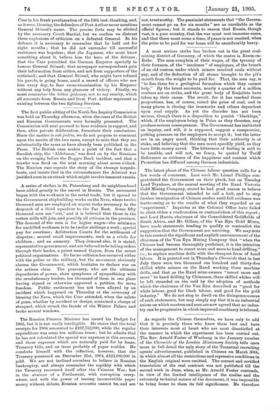A series of strikes in St. Petersburg and its neighbourhood
have added greatly to the unrest in Russia. The movement began with the workmen in the metal trade, but it spread to the Government shipbuilding works on the Neva, where twelve thousand men are employed on urgent tasks necessary to the despatch of a third squadron to the Far East. Some fifty thousand men are "out," and it is believed that those in the cotton mills will join, and possibly all artisans in the province. The demand of the men is for higher wages—the minimum for unskilled workmen is to be twelve shillings a week; special pay for overtime ; Arbitration Courts for the settlement of disputes ; several small improvements, such as a creche for children ; and an amnesty. They demand also, it is stated, representative government, and are believed to be taking orders through their leader, a priest named Gapon, from the secret political organisations. So far no collision has occurred either with the police or the military, but the movement obviously alarms the Government, which hesitates to declare war on the artisan class. The peasantry, who are the ultimate depositaries of power, show symptoms of sympathising with the revolutionary leaders, ten thousand of them in one place having signed or otherwise approved a petition for more freedom. Public excitement has not been allayed by an incident which happened on Thursday at the ceremony of blessing the Neva, which the Czar attended, when the salute of guns, whether by accident or design, contained a charge of shrapnel, which struck the facade of the Winter Palace and broke several windows.






































 Previous page
Previous page